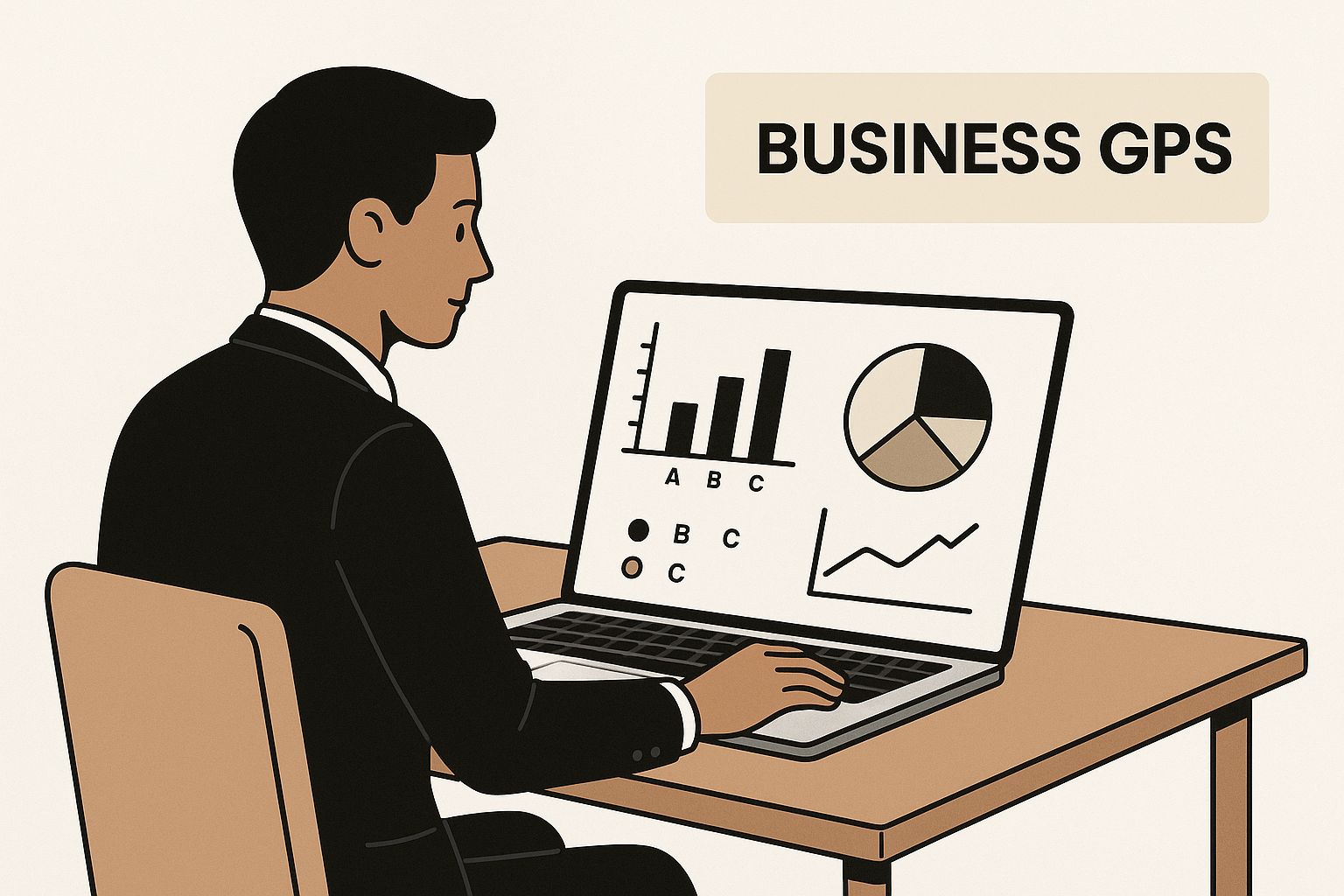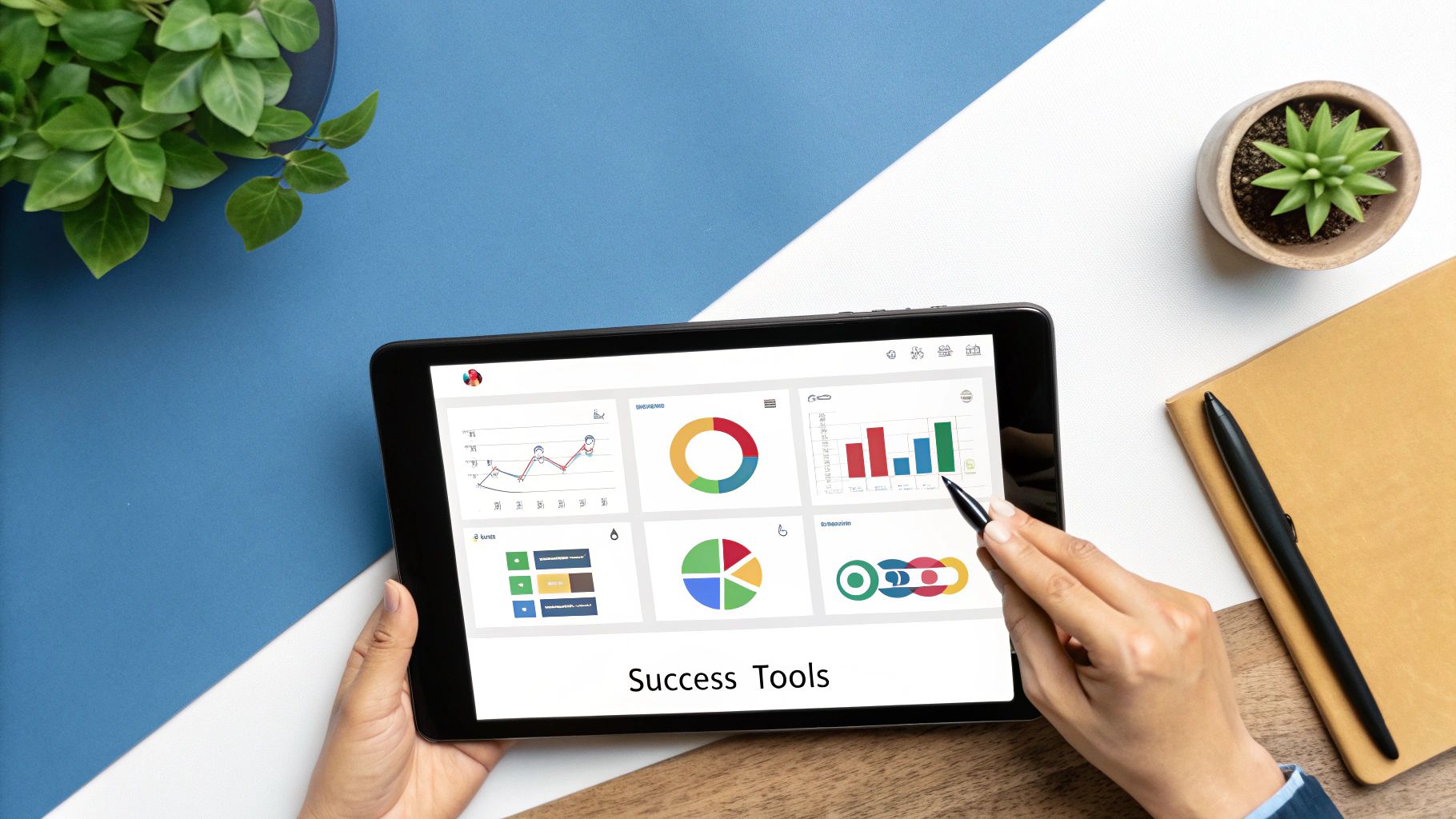Let's get one thing straight: for a small business or entrepreneur, an online business plan maker isn't some boring, fill-in-the-blanks document creator. Think of it more like a GPS for your entire entrepreneurial journey. It's a dynamic digital partner designed to take you from a scribbled-on-a-napkin idea to a solid, fundable strategy, breaking down what feels like an impossible task into simple, manageable steps.
Why You Need a Digital Business Partner
Starting a small business without a plan is a bit like setting off on a cross-country road trip with no map. Sure, you know where you want to end up, but the journey is full of unexpected detours and roadblocks. A traditional business plan, written in a Word doc, is like that old paper map you'd find in the glove box—it's helpful, but it's static and becomes outdated the moment you print it.
An online business plan maker, on the other hand, is your real-time GPS.
These tools are built for entrepreneurs who need structure but not the soul-crushing rigidity of old-school planning. They cut through the noise and demystify intimidating tasks like financial forecasting and market analysis, which can often feel like learning a new language. Instead of staring at a blank page, the software asks you the right questions and gives you a proven framework, making sure you cover all the bases for your business and marketing plans.
From Big Idea to Actionable Strategy
Every great small business starts with an idea, but that's the easy part. The real work is turning that concept into a profitable company, and for that, you need a clear strategy. This is where an online planner truly shines. It forces you to organize your thoughts and build a coherent plan that outlines not just your vision but the practical, step-by-step actions required to make it a reality.
The image below perfectly captures this idea, showing how a modern tool can act as your "Business GPS," bringing your business model, financials, and marketing plan together into one clear, easy-to-follow dashboard.

This centralized approach makes sure your business model and your marketing plan are in sync right from the start.
The Growing Demand for Smart Planning Tools
The move toward these digital tools isn't just a fleeting trend; it's a fundamental shift in how modern businesses are built and run. The global market for online business plan software is expected to hit $1.54 billion by 2025, a massive leap from $936.1 million in 2021. This explosive growth shows just how much startups and small businesses now rely on these platforms. You can discover more insights about the online business plan software market to see the full picture.
An online business plan maker doesn't just help you write a document; it helps you build a better business. It prompts you to answer the tough questions early on, saving you from costly mistakes down the line.
For a small business owner, this is a game-changer. You get access to professional-grade planning tools that, just a few years ago, were only available to huge corporations with deep pockets. Suddenly, you can create a compelling business case, a detailed marketing plan, and rock-solid financial projections without an MBA or an expensive consultant. It levels the playing field, giving every passionate entrepreneur a much better shot at success.
Core Features That Drive Small Business Success
A great online business plan maker is so much more than a digital Word document. Think of it as a dedicated toolkit, built by people who understand the real-world hurdles small business owners face. These platforms aren't just about filling in blanks on a form; they're designed to be a strategic partner. They handle the complex stuff so you can focus on building your business, not getting bogged down in paperwork.
From figuring out your financials to mapping out a marketing plan, every feature is there to solve a common, and often frustrating, problem for small entrepreneurs. They help you turn those big ideas floating around in your head into a concrete, actionable plan.

Guided Templates for Your Business Model
One of the best things about these tools is their library of guided templates. These aren't generic, one-size-fits-all documents. They’re more like industry-specific playbooks for small businesses. Whether you're launching a coffee shop, a tech startup, or a subscription box service, the right template makes sure you cover all your bases—especially the little details that are unique to your field.
For instance, a template for an e-commerce store will naturally guide you to think about your supply chain and shipping logistics. A service-based business template, on the other hand, will focus more on how you’ll land clients and structure your pricing. This kind of tailored guidance is what makes your final business plan truly relevant and powerful.
Financial Forecasting Without the Headaches
Let's be honest: for most entrepreneurs, the financial projection section is the most daunting part of writing a business plan. This is where a good online maker really shines. These tools completely remove the guesswork and the math-induced anxiety.
An online business plan maker acts like a financial translator. You provide simple inputs—like estimated sales and startup costs—and it automatically generates the professional financial statements that lenders and investors demand.
There's a reason the business planning software market is projected to hit $7.8 billion by 2033. The need is huge. In fact, financial planning is the single biggest function, making up 40% of the market share. Accurate forecasting isn't just a "nice to have"; it's what separates a dream from a viable business. You can learn more by checking out the latest business plan software statistics.
With just a few clicks, these financial engines can produce the essential documents you need:
- Cash Flow Statements: To see exactly how money will move in and out of your business.
- Profit and Loss Projections: To forecast your profitability down the road.
- Balance Sheets: To give a clear snapshot of your company's financial health at any given time.
This automation doesn't just save a small business owner a ton of time. It also dramatically reduces the risk of making a simple calculation error that could get your funding request denied.
Integrated Marketing and Competitor Analysis
A business plan isn't complete without a solid marketing strategy and a clear-eyed view of your competition. Modern plan makers build these components right into the process. You'll find sections that prompt you to define your target audience, choose your marketing channels, and set a realistic budget.
They also include tools for competitor analysis, helping you identify who you're up against and break down their strengths and weaknesses. This step is crucial. It forces you to figure out what makes your business different and how you'll communicate that value, ensuring your marketing plan is ready to compete from the moment you launch.
How AI Is Revolutionizing Business Planning
Artificial intelligence has officially moved out of the realm of science fiction and into your toolkit as a powerful co-strategist. When built into an online business plan maker, AI gives small entrepreneurs a serious competitive advantage, turning what used to be a static document into a living, intelligent roadmap for your business.
Think of it as having an experienced consultant on call 24/7, one that constantly sifts through data to help you make smarter decisions. This isn't just about spell-checking your executive summary anymore. The integration of AI is fundamentally changing how we create and manage business plans, offering powerful AI automation capabilities that were once only available to large corporations.

From Guesswork to Data-Driven Strategy
For small business owners, one of the biggest wins with AI is the ability to swap strategic guesswork for confident, data-backed choices. Instead of spending weeks manually digging through market reports, an AI-powered tool can analyze huge datasets in seconds to pinpoint profitable opportunities you might have missed.
Here’s what that looks like for your business and marketing plans:
- Business Model Adjustments: AI can analyze market trends and suggest you pivot from a one-time purchase model to a subscription service, because the data shows a much higher customer lifetime value with that approach.
- Marketing Plan Refinements: It might identify an untapped customer segment by analyzing demographic data, allowing you to fine-tune your marketing plan with laser precision.
- Content Generation: Some tools can even draft compelling marketing copy for your website or social media campaigns, making sure it’s perfectly aligned with your business description and ideal customer.
This kind of insight helps you build a more robust and resilient business from the very beginning.
Smarter Forecasts and Real-Time Insights
Financial forecasting is where AI really shines. An AI-enhanced business plan maker can sharpen your revenue projections by factoring in current economic trends, competitor pricing, and even subtle shifts in seasonal demand. The result is a far more realistic and reliable financial picture—something that both you and potential investors will appreciate.
AI doesn't replace the entrepreneur; it empowers them. It handles the heavy lifting of data analysis, freeing you up to focus on vision, creativity, and execution.
And this trend is picking up speed. By 2025, an estimated 67% of companies are expected to incorporate automation into their planning processes. Why? Because AI-driven platforms can boost productivity by around 40% and slash operational costs by up to 30% by providing real-time analysis and forecasting.
This shift is leveling the playing field, making it easier than ever for small entrepreneurs to compete on a larger scale by using intelligent tools to build smarter, stronger businesses.
How to Choose the Right Business Plan Maker
Picking the right online business plan maker can feel a lot like finding a business partner. With so many options out there, it’s easy to get distracted by fancy bells and whistles. The trick is to tune out the noise and zero in on a tool that actually fits your specific small business and where you want to go.
A good starting point is always the user experience. You're an entrepreneur, not a software engineer. The platform should feel natural and guide you through each part of your business plan without making you want to pull your hair out. If you’re struggling to find things during a free trial, that’s a big warning sign.
Aligning Features with Your Business Model
The perfect tool for a brand-new coffee shop isn't going to be the same one that a freelance consultant needs. Your choice should directly mirror what your business actually does. Look for platforms that offer templates and financial models built for your industry. A freelance consultant needs to nail down client acquisition costs in their marketing plan, while a retail shop needs to get its inventory forecasting just right.
Choosing an online business plan maker is less about finding the one with the most features and more about finding the one with the right features for you. An overly complicated tool can be just as unhelpful as one that's too basic.
Before you sign up, think about the future. A simple one-page plan might be all you need today, but will that same software be able to handle complex cash flow projections or track your performance once you're up and running? The idea is to find a tool that can grow alongside your business.
Key Evaluation Criteria for Small Entrepreneurs
To feel confident in your choice, you need a clear set of criteria. Look past the price and think about the real value each platform brings to the table. For anyone just starting out, having a solid framework is a game-changer. If you're in that early stage, our Starter Pack for new businesses can be a fantastic resource for getting your ideas in order.
To help you compare your options, I've put together a table that breaks down the most important factors.
Table: Key Factors for Selecting Your Business Plan Tool
This checklist highlights the critical features and considerations to help you choose the best online business plan maker for your specific needs as a small business owner.
| Evaluation Criteria | What to Look For | Why It Matters for a Small Business |
|---|---|---|
| Industry-Specific Templates | Pre-built outlines for niches like SaaS, retail, restaurants, or non-profits. | A good template acts like a roadmap, ensuring you don't miss industry-specific details investors and lenders will look for. |
| Financial Forecasting Tools | The ability to create detailed sales forecasts, cash flow statements, and break-even analysis. | This is the heart of your plan. Strong financial projections show that your business is not just a good idea, but a viable one. |
| Software Integrations | Connections to accounting software (QuickBooks, Xero), CRM, or marketing tools. | Integrations save you from endless manual data entry and keep your plan updated with real-time financial performance. |
| Collaboration Features | The option to invite team members, advisors, or mentors to view, comment on, and edit the plan. | Business plans are rarely a solo effort. Good collaboration tools make it easy to get feedback and keep everyone aligned. |
| Customer Support | Access to help via live chat, email, phone, or a detailed knowledge base. | When you hit a roadblock on a tricky financial projection at 10 PM, responsive and helpful support is invaluable. |
Ultimately, a business plan maker is a tool to clarify your vision and guide your decisions. By focusing on ease of use, relevance to your business, and the key features that truly matter, you'll find a platform that empowers you to build something great.
Crafting Your Plan From Start to Finish
Turning a great idea into a polished, professional business plan can feel overwhelming. Where do you even begin? This is where an online business plan maker becomes your co-pilot, breaking down the entire process into simple, manageable steps. Forget staring at a blank page; these tools give you a structured path to follow, walking you through everything from your high-level vision to the nitty-gritty financial details.
This guided approach is a lifesaver for entrepreneurs and small business owners who need structure, not more confusion. It’s designed to help you organize your thinking and make sure you don’t miss a single crucial piece of your business model or marketing strategy.
Starting with the Executive Summary
First impressions matter, and your executive summary is your business plan’s first impression. It's a quick, punchy overview of your entire plan, designed to hook the reader and make them want to learn more. A good online tool will prompt you with the right questions to boil your entire vision down into a compelling snapshot.
Think of it like the trailer for a movie. It needs to hit all the highlights without giving everything away:
- Your Mission: What’s the core problem you're solving?
- Your Solution: How do your products or services fix that problem?
- Your Target Market: Who are you selling to?
- Your Financial Highlights: What are your key projections for sales and profit?
A little pro-tip: write this part last. It’s much easier to summarize everything once you’ve already worked through all the details. The software simplifies this by helping you pull the most important points from the sections you've already completed.
Building Your Business and Marketing Plans
With the big picture in mind, the tool then dives deeper into the heart of your strategy. This is where you lay the bricks for your business model, explaining how all the moving parts connect to build a successful, profitable company.
Before you get too far, it's smart to confirm your idea is actually viable. For a step-by-step walkthrough on this, check out our guide on how to conduct a feasibility study for your business. Getting this right early on ensures your entire plan is built on a solid foundation.
From there, you’ll start working through the core sections:
- Market Analysis: You'll get specific about your target audience and size up the competition. The software prompts you to dig into their strengths and weaknesses, which helps you find your own unique spot in the market.
- Products and Services: This is where you detail exactly what you're selling. You’ll describe your offerings, explain your pricing, and articulate what makes your solution better than anyone else's.
- Marketing and Sales Strategy: How are you going to find and win customers? You'll map out your plan, from the marketing channels you'll use (like social media or content marketing) to your core sales process.
An online business plan maker doesn't just ask what you're going to do; it pushes you to explain the how and the why. This forces you to think critically and add a layer of detail that makes your whole strategy stronger.
By breaking the project down into these focused modules, the software turns a daunting task into an organized, step-by-step process. You'll move from a rough idea to a comprehensive, professional document that can guide your launch or seriously impress potential investors.
Turn Your Plan into a Living Business Tool
So many entrepreneurs make the same mistake: they treat their business plan like a final exam. They slave over it, get it done, and then tuck it away in a drawer, never to be seen again. But the real power of a business plan isn't just in the writing—it's in the using. It should be a living, breathing guide for your small business. This is exactly where an online business plan maker shines, turning that static document into a dynamic dashboard you can use to actually steer your company.
Think of it as a shift in perspective. Your plan isn't a one-and-done project. It’s your command center for making smart, data-informed decisions. It stops being just a roadmap for getting started and becomes a real-time GPS for navigating growth.
Track Performance Against Projections
Most modern online planners come with performance dashboards, and honestly, they're a game-changer. These tools often connect directly with your accounting software, pulling in your actual financial data. This means you can see, at a glance, how your real-world performance is stacking up against the financial projections you made.
Are sales hitting their targets? Are your expenses creeping up higher than you budgeted? Having this constant feedback loop is incredibly valuable for a small business to catch problems early and seize opportunities.
Think of your business plan as a hypothesis. Your dashboard is where you test that hypothesis against reality. It shows you what’s working, what isn’t, and lets you adjust on the fly.
Adapt Your Marketing and Strategy
The market is always shifting, and your marketing plan needs to keep up. As you start getting real feedback from customers and see which campaigns are actually bringing in business, you can jump right back into your online plan and update your strategy.
This ensures your marketing efforts are always based on what's happening now, not on the assumptions you made months ago. When you use your plan this way, it keeps your entire team pulling in the same direction, focused on the same strategic goals. It becomes an indispensable part of your daily operations and your blueprint for long-term success.
Frequently Asked Questions
When you're deep in the trenches of building a small business, you're bound to have questions about the best way to map out your strategy. Let's tackle some of the most common ones we hear about using an online business plan maker.
Can I Use an Online Tool for a Non-Profit
Yes, you absolutely can. Many of the best platforms aren't just for for-profit ventures; they come equipped with templates designed specifically for non-profits.
These specialized frameworks help you focus on the essentials for your organization, like outlining your mission, detailing your fundraising strategy, and defining program outcomes. If you're planning to apply for grants, make sure the tool you choose explicitly offers a non-profit structure.
Is My Business Data Secure
This is a big one, and rightly so. Reputable platforms take data security very seriously. They use standard measures like SSL encryption to protect your information as it travels online and store your plan in secure cloud environments.
Before you commit to a tool, always take a minute to read their privacy policy. You want to be confident that your unique business ideas and financial details will remain confidential. For a deeper dive into data protection, check out our complete FAQ page.
How Much Do These Tools Cost
The price tag can vary quite a bit. You'll find some tools that offer a free, basic version, which can be a great way for an entrepreneur to get their feet wet.
Most, however, run on a monthly subscription, usually falling somewhere between $15 to $50 per month. The price often depends on the power of the features included, like detailed financial forecasting, AI-driven help with your marketing plan, or tools that let you collaborate with your team.
Ready to stop staring at a blank page and start building a solid strategy? With GrowthGrid, you can generate a complete, professional business plan in under 15 minutes. Our AI-powered platform takes the guesswork out of everything from financial projections to market analysis, saving you precious time and money. Start building your business plan with GrowthGrid today.
